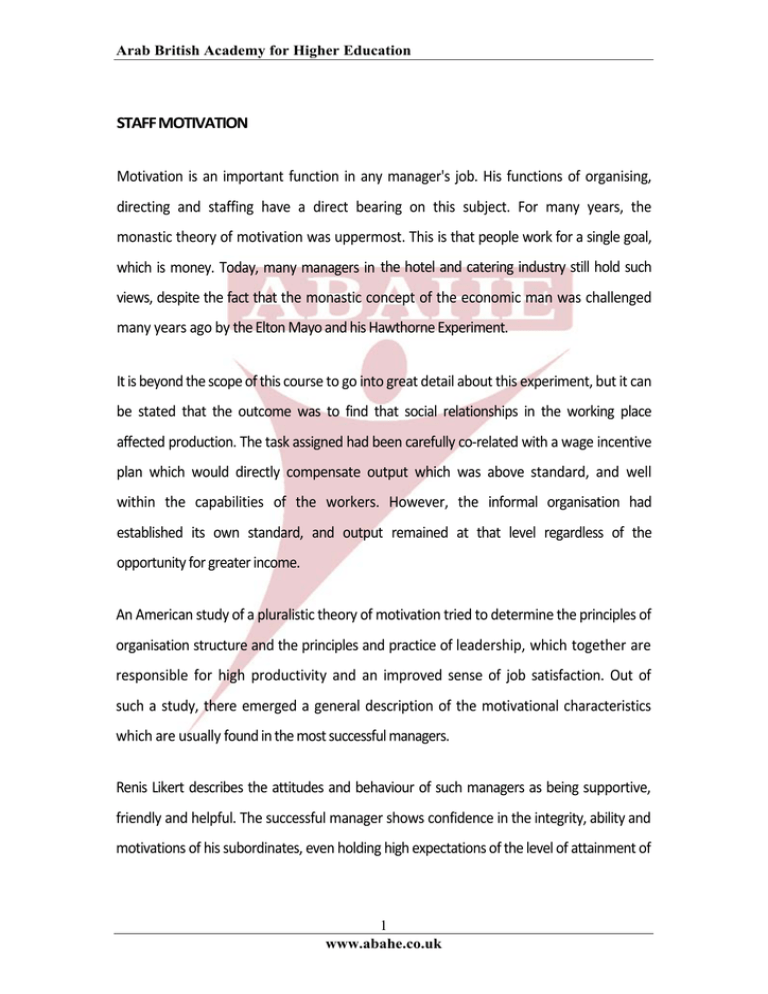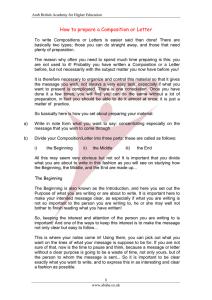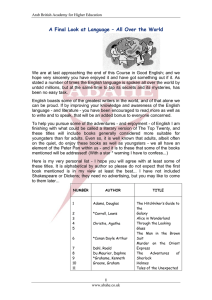
Arab British Academy for Higher Education
STAFF MOTIVATION Motivation is an important function in any manager's job. His functions of organising, directing and staffing have a direct bearing on this subject. For many years, the monastic theory of motivation was uppermost. This is that people work for a single goal, which is money. Today, many managers in the hotel and catering industry still hold such views, despite the fact that the monastic concept of the economic man was challenged many years ago by the Elton Mayo and his Hawthorne Experiment. It is beyond the scope of this course to go into great detail about this experiment, but it can be stated that the outcome was to find that social relationships in the working place affected production. The task assigned had been carefully co‐related with a wage incentive plan which would directly compensate output which was above standard, and well within the capabilities of the workers. However, the informal organisation had established its own standard, and output remained at that level regardless of the opportunity for greater income. An American study of a pluralistic theory of motivation tried to determine the principles of organisation structure and the principles and practice of leadership, which together are responsible for high productivity and an improved sense of job satisfaction. Out of such a study, there emerged a general description of the motivational characteristics which are usually found in the most successful managers. Renis Likert describes the attitudes and behaviour of such managers as being supportive, friendly and helpful. The successful manager shows confidence in the integrity, ability and motivations of his subordinates, even holding high expectations of the level of attainment of 1
www.abahe.co.uk
Arab British Academy for Higher Education
his staff. He sees that all are well trained and prepared for the next level of appointment. He coaches and assists any whose work is below par. Such an approach to management has considerable impact because all human beings have a strong desire for a secure and supportive relationship. That is, a relationship which gives them a sense of personal worth in face to face groups which are important to them. The successful motivator is aware of these human needs and he creates an atmosphere which is conducive to their fulfilment. Motivation can, therefore, be defined as "providing the motives which impel staff to put forward their best effort, and it is also concerned with the creation of the right climate for putting forth such efforts, and satisfying the inner drives, intentions and impulses which cause individuals to act as they do". Principles of motivation are difficult to establish because human behaviour is so complex and not easily understood. All people differ individually, and they are continually learning and changing. However, there is a wide amount of agreement on a number of factors to which most people respond. The relative importance of each factor will vary from person to person and in different situations, but often they carry enough weight as to warrant serious consideration by every manager. These factors are: (a) Increased income (b) Social status and respect (c) Security (d) Interesting work (e) A chance to develop (f) An activity which is worthwhile 2
www.abahe.co.uk
Arab British Academy for Higher Education
(g) Personal power and influence (h) Being treated as an individual (i) Having a say in your own affairs (j) Fair supervision Motivational processes can be described as being circular. They start with a tension or drive which leads to an acute consciousness of unfilled needs. This is then followed by a sense of restlessness and a search for some method to satisfy these needs. Finally, the needs are, to some extent, fulfilled, and need satisfaction is attained. The process is completed when an evaluation is made of the extent of satisfaction obtained, and a decision is made regarding the behaviour which is to follow. Dr A H Maslow developed a hierarchy of human needs to assist in determining correct motivation. This is described below: The primary needs are basically physiological and psychological and they are generated by deficiencies, the most demanding of which is the need for food and shelter and other deficits which actually threaten physical survival. These needs can be arranged in an hierarchy, from the most to the least crucial for immediate survival of the organism. Until the most demanding needs are satisfied, all the others are excluded. (When hunger enters the door, love flies out of the window). When these primary needs have been satisfied it is possible for the individual to attend to higher basic needs, such as affection and security. These higher basic needs, in turn, dominate behaviour as long as their satisfaction is incomplete or in doubt. Only when satisfaction of the full hierarchy of basic needs has been achieved can the meta goals be pursued. Maslow defines meta need as the fulfilment which 3
www.abahe.co.uk
Arab British Academy for Higher Education
follows self‐actualisation which is a state which is achieved by very few people. Usually some of the meta goals are attained, but if the remainder of the meta goals are frustrated, then the person will react with apathy, cynicism and alienation. Such, Maslow claims, is the fate of many well‐fed and well‐cared for people today. A fundamental tenet of this theory is that you can never satisfy a man's secondary needs before his primary ones are fulfilled. In other words, you cannot motivate a hungry member of the staff to give more effort by creating for him a chance of self‐
fulfilment. McGregor stated that behind every managerial decision or action there are assumptions about human nature and human behaviour. He evolved his theories of human behaviour by contrasting the conventional and widely held assumptions of man as a work animal, who dislikes work itself, who requires continuous coercion, control and threats to keep him working, which he called Theory X, with a pattern of management which attempts to explain things quite differently, which he called Theory Y. Theory Y posits the following assumptions which are motivational in character:
The expenditure of physical and mental effort in work is as natural as in play and rest.
External control and the threat of punishment are not the only means of bringing about the effort towards organisational objectives. Men will exercise self‐direction and self‐control in in the service of objectives to which he is committed. 4
www.abahe.co.uk
Arab British Academy for Higher Education
Commitment to objectives is a function of the rewards which are associated with their achievement.
The average human being learns, under proper conditions, not only to accept, but to seek responsibility
The capacity to exercise a comparatively high degree of imagination, ingenuity and creativity in the solution of organisational problems, is widely, not narrowly, distributed in the population.
Under the conditions of modern industrial life, the intellectual potentialities of the average person are only partly utilised. These assumptions are not fully validated, but they would seem to relate more accurately to working life than those proposed by the Theory X approach. All Rights Reserved © Arab British Academy for Higher Education
5
www.abahe.co.uk






